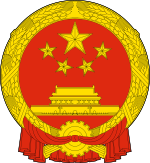Ministry of Culture and Tourism of the People's Republic of China
| 中华人民共和国文化和旅游部 Zhōnghuá Rénmín Gònghéguó Wénhuà hé lǚyóubù | |
 | |
| Agency overview | |
|---|---|
| Formed | March 19, 2018 |
| Jurisdiction | |
| Headquarters | Beijing |
| Minister responsible | |
| Parent agency | State Council |
| Website | https://www.mct.gov.cn/ |
Politics of China |
|---|
 |
|
The Ministry of Culture and Tourism, abbreviated as MCT (simplified Chinese: 中华人民共和国文化和旅游部; traditional Chinese: 中華人民共和國文化和旅遊部; pinyin: Zhōnghuá Rénmín Gònghéguó Wénhuà hé lǚyóubù) is a ministry responsible for formulating cultural and tourism policies of Mainland China. Its headquarters are in Chaoyang District, Beijing. It was formed on 19 March 2018; its predecessors were the Ministry of Culture and China National Tourism Administration.[2]
History[]
On March 19, 2018, the Government of the People's Republic of China announced that the Ministry of Culture and China National Tourism Administration have been merged to create the Ministry of Culture and Tourism at the first session of the 13th National People's Congress. That same day, Luo Shugang was elected Minister of Culture and Tourism.[3]
Censorship[]
In September 2020, China News Service reported that the Ministry of Culture and Tourism stated that it will focus on strengthening the content censorship and on-site supervision of talk shows, Xiangsheng, Pioneer drama, experimental drama and other language shows.[4]
List of ministers[]
| No. | Name | Took office | Left office | Notes |
|---|---|---|---|---|
| 1 | Luo Shugang | 19 March 2018 | August 2020 | [5] |
| 2 | Hu Heping | 11 August 2020 | Incumbent |
See also[]
- China Arts and Entertainment Group
- Ministries of the People's Republic of China
References[]
- ^ "China's new cabinet members endorsed". Chinadaily. 2018-03-19.
- ^ 文化部、国家旅游局合并为“文化和旅游部”. Sohu (in Chinese). 2018-03-13.
- ^ 雒树刚被任命为首位文化和旅游部部长(附简历). ce.cn (in Chinese). 2018-03-19.
- ^ Chen, Haifeng. "Ministry of Culture and Tourism: Focus on strengthening the content censorship and on-site supervision of talk shows and other programs". China News Service. Archived from the original on 17 September 2020. Retrieved 17 September 2020.
- ^ 文化和旅游部部长雒树刚:推动中华文化走向世界. iFeng (in Chinese). 2018-03-20.
- Government ministries of the People's Republic of China
- Culture ministries
- Tourism ministries
- Ministries established in 2018
- 2018 establishments in China

